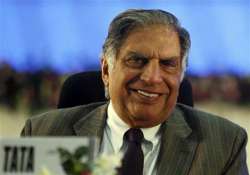Ratan Tata to retire tomorrow, Cyrus Mistry to succeed
Mumbai, Dec 27: Ratan Tata, who led the transformation of the Tata group from a conventional corporate house into a USD 100 billion global conglomerate with high-profile acquisitions abroad, will retire tomorrow ending a 50-year

Mumbai, Dec 27: Ratan Tata, who led the transformation of the Tata group from a conventional corporate house into a USD 100 billion global conglomerate with high-profile acquisitions abroad, will retire tomorrow ending a 50-year run in one of India's oldest business empires.
Marking a generational change, Tata, who turns 75 tomorrow, will hand over the reins of the group to 44-year-old Cyrus Mistry, who was chosen his successor last year and formally appointed Chairman earlier this month.
Tata is hanging up his boots after steering the group for 21 years as its Chairman, when he succeeded the legendary JRD Tata. While JRD made Tata the Chairman out of the blue in 1991, Mistry of the Shapoorji Pallonji group and whose family owns 18 per cent stake in Tata Sons, was chosen by a five-member selection committee.
During Tata's tenure, the group's revenues grew manifold, totalling USD 100.09 billion (around Rs 475,721 crore) in 2011-12 from a turnover of a mere Rs 10,000 crore in 1971.
His vision to transform the group into a multinational giant resulted in high profile acquisitions such as Tata Tea's takeover of UK brand Tetley for USD 450 million in 2000.
But Ratan Tata set new standards for the Indian corporates in the current era of globalisation when Tata Steel acquired Anglo-Dutch rival Corus for 6.2 billion pounds beating CSN of Brazil in 2007.
A year later, the group's automotive firm Tata Motors lapped up British luxury vehicle maker Jaguar Land Rover for USD 2.3 billion from Ford Motor Co.
Even as Tata was concentrating on activities abroad, he came up with the idea of producing the world's cheapest car when he conceived the 'Rs one lakh' small car Nano. The Tata group underwent moments of high tension in executing the Nano project when it got into problems on acquisition of land in Singur in West Bengal.
Ironically, the group had to shift the project from Singur, where he was invited by Marxist Chief Minister Buddhadeb Bhattacharya, to Sanand in Gujarat at the invitation of Narendra Modi.
Although Nano could not live up to the expectations after its initial worldwide acclaim, the small car will still be remembered as Tata's desire to provide a "safer" option to many Indian lower-middle class families riding two-wheelers.
In a recent interview to PTI, he said Singur was a "great disappointment" for him because he went there "in a leap of faith" thinking that part of the country was being ignored industrially. Tatas will still go to West Bengal someday, he said.
Under Tata, the group also made great strides when it capitalised on the sunrise industry of information technology in the 90's. With revenues of over USD 10 billion in 2011-12, Tata Consultancy Services (TCS) is today India's largest IT company.
Marking a generational change, Tata, who turns 75 tomorrow, will hand over the reins of the group to 44-year-old Cyrus Mistry, who was chosen his successor last year and formally appointed Chairman earlier this month.
Tata is hanging up his boots after steering the group for 21 years as its Chairman, when he succeeded the legendary JRD Tata. While JRD made Tata the Chairman out of the blue in 1991, Mistry of the Shapoorji Pallonji group and whose family owns 18 per cent stake in Tata Sons, was chosen by a five-member selection committee.
During Tata's tenure, the group's revenues grew manifold, totalling USD 100.09 billion (around Rs 475,721 crore) in 2011-12 from a turnover of a mere Rs 10,000 crore in 1971.
His vision to transform the group into a multinational giant resulted in high profile acquisitions such as Tata Tea's takeover of UK brand Tetley for USD 450 million in 2000.
But Ratan Tata set new standards for the Indian corporates in the current era of globalisation when Tata Steel acquired Anglo-Dutch rival Corus for 6.2 billion pounds beating CSN of Brazil in 2007.
A year later, the group's automotive firm Tata Motors lapped up British luxury vehicle maker Jaguar Land Rover for USD 2.3 billion from Ford Motor Co.
Even as Tata was concentrating on activities abroad, he came up with the idea of producing the world's cheapest car when he conceived the 'Rs one lakh' small car Nano. The Tata group underwent moments of high tension in executing the Nano project when it got into problems on acquisition of land in Singur in West Bengal.
Ironically, the group had to shift the project from Singur, where he was invited by Marxist Chief Minister Buddhadeb Bhattacharya, to Sanand in Gujarat at the invitation of Narendra Modi.
Although Nano could not live up to the expectations after its initial worldwide acclaim, the small car will still be remembered as Tata's desire to provide a "safer" option to many Indian lower-middle class families riding two-wheelers.
In a recent interview to PTI, he said Singur was a "great disappointment" for him because he went there "in a leap of faith" thinking that part of the country was being ignored industrially. Tatas will still go to West Bengal someday, he said.
Under Tata, the group also made great strides when it capitalised on the sunrise industry of information technology in the 90's. With revenues of over USD 10 billion in 2011-12, Tata Consultancy Services (TCS) is today India's largest IT company.